John Dewey, Horace Mann, Maria Montessori. The same names we always hear. But there are so many other educationists who transformed schools around the world. Through their writing, theory-building, entrepreneurship & advocacy, educationists in Latin America, Africa, South Asia & Southeast Asia opened up freedom & opportunity for millions.
The first part of my book features educationists from the Global South - to illustrate the power of education reform. When I shared ideas with this community and asked for help, you delivered! It’s incredible to see the collective knowledge of the 6,367 people following EdWell from around the world. To return the favor, here is the full list of educationists, under 5 themes (these are all from the past i.e. deceased):
REACHING THE MOST MARGINALIZED
🇬🇭 Efua Sutherland - Children’s Rights Advocate
🇮🇳 Tarabai Modak - Montessori Mother
🇮🇳 B. R. Ambedkar - Baba Saheb (Respected Father)RESISTANCE TO OPPRESSION
🇧🇷 Paulo Freire - Founder of Critical Pedagogy🇮🇩 Ki Hajar Dewantara - Father of Indonesian National Education
🇰🇪 Rebecca Njeri - Mother of the Mau Mau Children
🇿🇦 Harold Cressy - Organizer of TeachersWOMEN’S RIGHTS
🇮🇩 Raden Adjeng Kartini - Javanese Princess Turned Feminist
🇳🇬 Funmilayo Ransome-Kuti - Lioness of Lasabi🇧🇩 Begum Rokeya - Feminist Futurist
🇮🇳 Savitribai Phule - India’s 1st Female TeacherSCHOOL FOUNDERS
🇮🇳 Rabindranath Tagore - Kabiguru (Teacher of Poets)
🇲🇦 Fatima al-Fihriya - Umm al-Banīn (Mother of the Children)🇵🇰 Syed Ahmad Khan - Advocate of Education for Muslims
POLICYMAKERS
🇦🇷 Domingo Faustino Sarmiento - Schoolmaster President
🇹🇿 Julius Nyerere - Mwalimu (Teacher)
1 REACHING THE MOST MARGINALIZED
🇬🇭 EFUA SUTHERLAND
Children’s Rights Advocate
Ghana - 1924-1996
Pan-Africanist, writer, teacher & activist for children’s rights. Wrote plays, curriculum & children’s books, often based on African folktales, because she believed children were forced to read literature unrelated to their own environment. After university in the UK, returned to newly independent Ghana in 1957 to start arts/education organizations (such as a School for Performing Arts, the Ghana Society of Writers, training programs for playwrights, a publishing company & an initiative to bring science learning to rural children). Influenced Ghana to be the 1st country to ratify the UN Convention on the Rights of the Child & chaired the National Commission on Children from 1983-1990. (Ghana is still a hub for early childhood education, as one of the 1st African governments to introduce two years of compulsory preschool, in 2007, & award-winning models like Lively Minds & Sabre.)

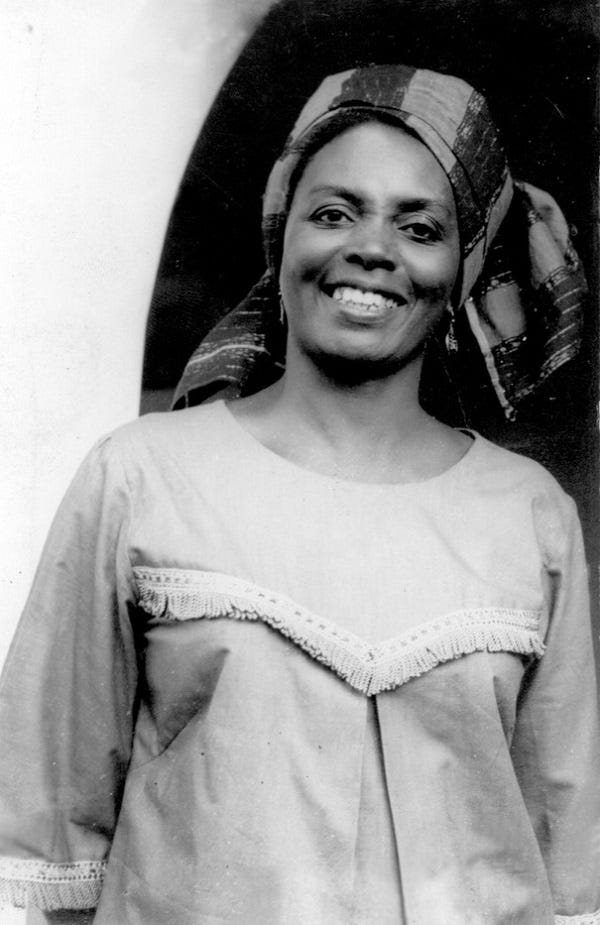
LEARN MORE: Read Playtime in Africa, Sutherland's book about children’s play culture.🇮🇳 TARABAI MODAK
Montessori Mother
India - 1892-1973
Pioneer of early childhood education in India & a theory that to reach the most marginalized children, not only should children come to school, but schools should come to children. Started the balwadi model in 1926 - preschools using locally-available teaching materials (such as sticks or feathers), often located in home courtyards - that was scaled by India’s government in 1975 (today there are 1.4 million informal preschools in India). Co-founded the 1st training college for preschool teachers in India & Nutan Bal Shikshan Sangh, an international research center for early childhood education. Wrote children’s books & books for parents about how to teach children. Called the “Montessori Mother” because she adapted Montessori methods to India.


LEARN MORE: Read a UNICEF history of Modak's anganwadi preschools.🇮🇳 B.R. AMBEDKAR
Baba Saheb (Respected Father)
India - 1891-1956
Activist, lawyer, economist & professor of political economy who advocated for education access for Dalits, the lowest rung in India’s caste system. Born into a Dalit caste, he shaped India’s independence movement to prioritize Dalit rights (frequently in conflict with Gandhi) & influenced affirmative action in education. Helped ensure that Dalits had reserved seats in Provincial legislatures, added the right to education into India's constitution & was Law & Justice Minister in post-independence India’s 1st cabinet. Started movements against untouchability & the Peoples Education Society to enable higher education access for low-income people. Called Baba Saheb: “respected father.”


LEARN MORE: Read a recent biography, Arundhati Roy’s book about Ambedkar & Gandhi, or the Radical in Ambedkar.2 RESISTANCE TO OPPRESSION
🇧🇷 PAULO FREIRE
Founder of Critical Pedagogy
Brazil - 1921-1997
Author who developed critical pedagogy, an education model where students reflect on oppressive systems & co-create knowledge to take action for liberation. Led large-scale literacy campaigns with uneducated farmers in Brazil (literacy was a prerequisite to vote). Minister of Education for São Paulo. Inspired by Karl Marx & Frantz Fanon, wrote or co-wrote 20 books, including the most-cited book on education. Influenced the liberation theology movement in the 1970’s - a key force opposing Brazil’s military dictatorship between 1964-1985. Shaped education initiatives in Cuba, Mozambique, Peru & Guinea-Bissau; catalyzed popular education models to spread to Nicaragua & other resistance movements. Freire was imprisoned for 70 days in 1964 & spent 16 years exiled from Brazil. Shaped countless teachers to view education as a tool for social & political consciousness.


LEARN MORE: Read Freire’s book Pedagogy of the Oppressed, the world’s most cited book on education.🇮🇩 KI HAJAR DEWANTARA
Father of Indonesian National Education
Indonesia - 1899-1959
Journalist & activist in the Indonesian independence movement, considered the “Father of Indonesian National Education.” Born into a noble family, he attended schools for European children (unlike most Indonesians) & advocated for education for native Indonesians under Dutch colonization. At 24, he was arrested & exiled to the Netherlands for 5 years, for writings critical of the colonial government. Later started Taman Siswa, one of the 1st schools for native Indonesians (when only Dutch colonizers & Javanese aristocracy had schools); influenced by Rabindranath Tagore’s school (started in rural India in 1901) & Maria Montessori, Dewantara’s school promoted Indonesian culture, music & dance through a family-like environment. By the 1930’s, the school chain spread as part of the lead up to Indonesians declaring independence in 1945 - which influenced decolonization movements worldwide.

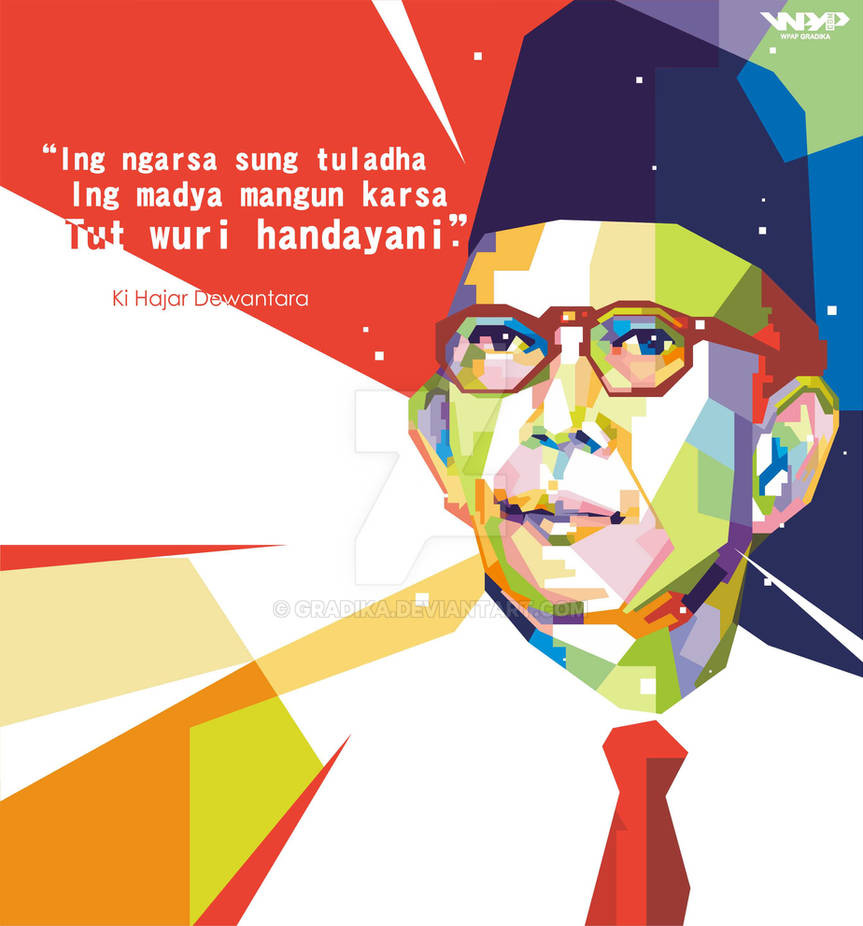
LEARN MORE: Read a profile of Dewantara.🇰🇪 REBECCA NJERI
Mother of the Mau Mau Children
Kenya - 1895-Year of Death Unknown
Leader in the Mau Mau movement for Kenyan independence, who advocated for girls’ education & Afrocentric curriculums. After attending a missionary boarding school, she advocated for Kenyan communities to start 63 anti-colonial schools for boys, through the Kikuyu independent schools movement. When they started a teacher training college, she convinced leaders (including Jomo Kenyatta, later Kenya’s 1st President), to build a section for training female teachers. This became Kenya’s 1st non-colonial school for girls & Njeri was the 1st headmistress, called the “Mother of the Mau Mau children.” While colonial missionary schools taught only agricultural & industrial skills, Kikuyu schools focused on academic skills & self-autonomy. This was met with a brutal crackdown in the 1950’s, when British colonizers closed Kikuyu schools, imprisoned Njeri without trial & detained nearly 1.5 million Kenyans in violent internment camps, before Kenyan independence in 1963.

LEARN MORE: Read a profile of Njeri.🇿🇦 HAROLD CRESSY
Organizer of Teachers
South Africa - 1889-1916
South African headteacher, writer, activist & Co-founder of the Teachers’ League of South Africa (TLSA). 1st Coloured person to graduate from a South African university. Headteacher of the 1st secondary school in Cape Town for Black & Coloured students (in District 6, a majority-Coloured neighborhood). Published essays in activist newspapers to advocate for increased pay for Coloured teachers. Though Cressy died at 27, he had a powerful impact beyond his death. As G.H. Gool wrote, “Cressy was a pioneer in the fight against the weight of oppression. The government was trying to use the teachers to ingrain its race logic into the Non-Europeans.” In the 1950’s, the TSLA organized teachers to resist Bantu Education, a national policy to offer Black & Coloured South Africans an inferior education (to perpetuate White power/wealth). District 6 was key to the anti-apartheid struggle; in 1966, the apartheid government forcibly removed over 60,000 residents & razed their homes, to transfer land to Whites.
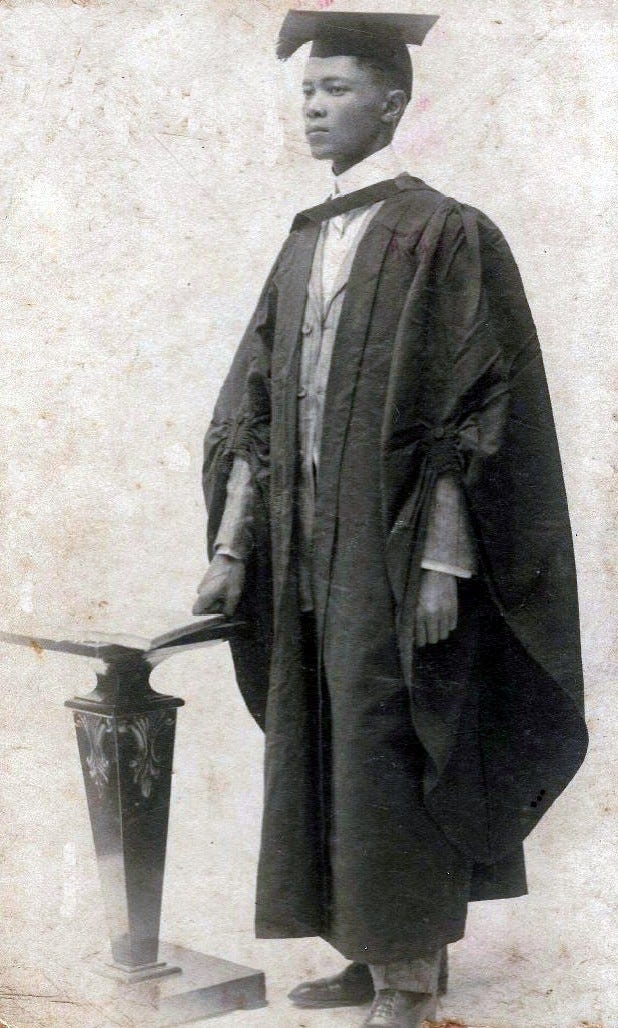

LEARN MORE: Read a profile or biography of Cressy.3 WOMEN’S RIGHTS
🇮🇩 RADEN ADJENG KARTINI
Javanese Princess Turned Feminist
Indonesia - 1879-1904
Teacher, school founder & writer who advanced movements for women's rights & advocated for female education in Indonesia. Like Dewantara, Kartini was born into an aristocratic Javanese family & was one of the 1st Indonesians to attend a Dutch school. In letters to pen pals (Dutch socialists & feminists), she critiqued the colonial system & argued that Javanese girls should not be denied education; she opposed men having multiple wives & purdah (keeping teenage girls in seclusion). Started her own school for girls. According to Wikipedia, “in 1903, she wrote a report to the government entitled ‘Educate the Javanese Now’ that discussed the significance of receiving a quality education and offered some recommended methods for achieving it.” After Kartini died at 25, others launched ‘Kartini Schools’ & her letters were published in a book, Letters of a Javanese Princess, that influenced Indonesia’s independence movement.
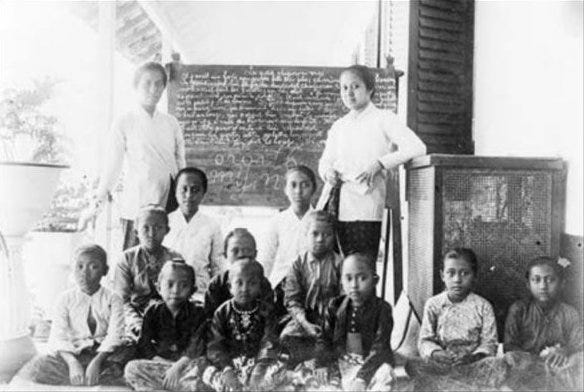

LEARN MORE: Read a profile, Kartini’s letters published in The Atlantic in 1919 or watch Kartini: Princess of Java on Netflix.🇳🇬 FUNMILAYO RANSOME-KUTI
Lioness of Lasabi
Nigeria - 1900-1978
Teacher, activist & suffragist for women’s right to vote, who shaped the Nigerian independence movement. Started some of the 1st preschool classes in Nigeria, literacy training for low-income market women & schools across the Abeokuta area. Founded the Abeokuta Women’s Union, which organized large-scale mass protests against taxes on female market traders (with over 10,000 protesters). Nigerian media called her the “Lioness of Lasabi” (Lasabi is the traditional hero of the Egba people). Chairman of the Western Nigeria Advisory Board of Education & consultant to Nigeria’s Ministry of Education on teacher recruitment. Travelled widely to speak about Nigeria’s women’s movement, such as a trip to meet Mao Zedong in China. Her husband was a co-founder of the Nigeria Union of Teachers & her son, Afrobeat musician & activist Fela Kuti, was a leading critic of Nigeria’s military government. She died after soldiers threw her out a window.

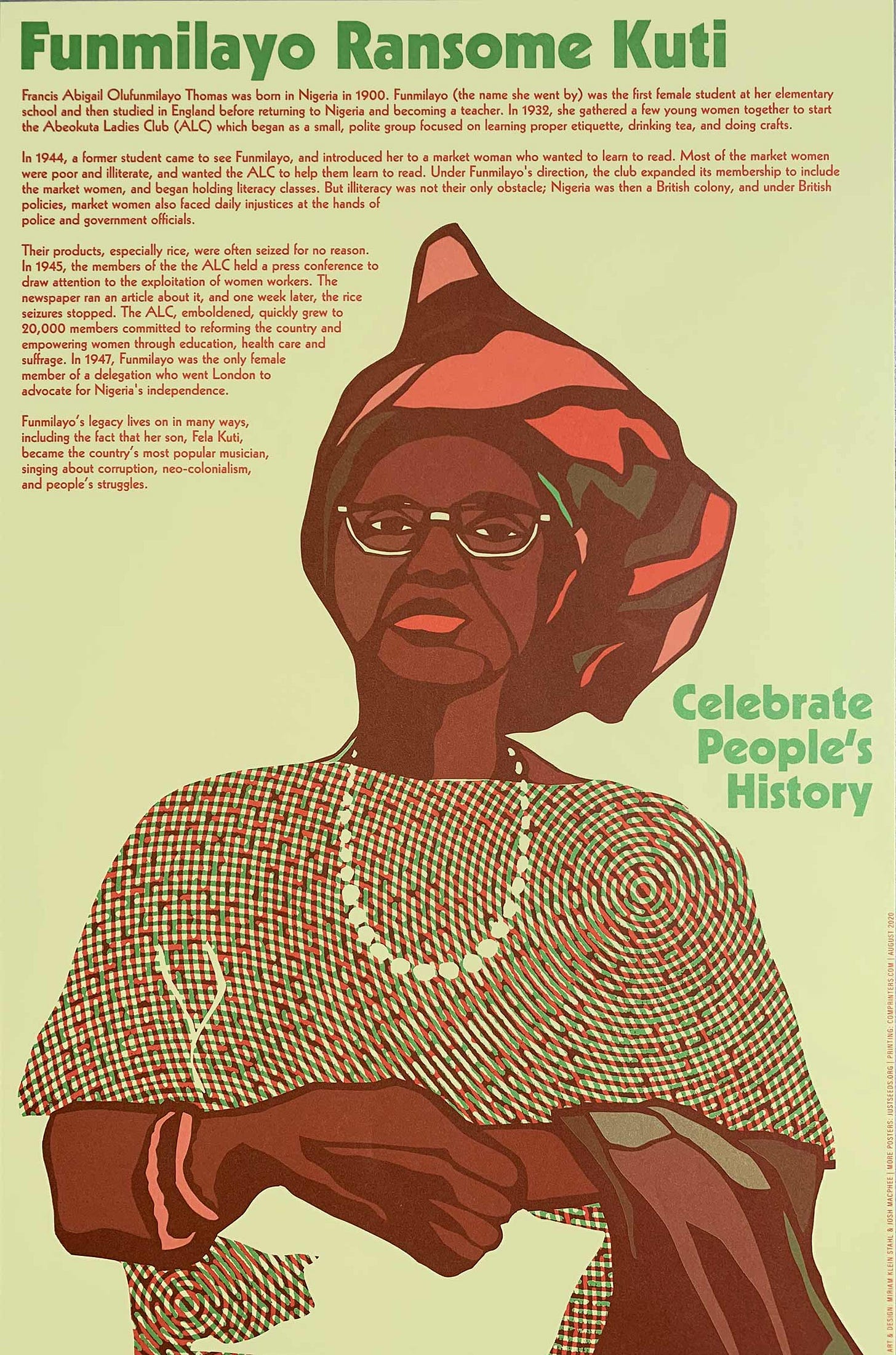
LEARN MORE: Watch a biopic about Ransome-Kuti; read a profile or a comic about the Abeokuta Women's Revolt.🇧🇩 BEGUM ROKEYA
Feminist Futurist
Bangladesh - 1880-1932
Writer, school founder & advocate for women’s rights who believed that education is the key to women’s liberation. Born into a conservative Muslim family, she opened the 1st school for Muslim girls in Bengal (an area later split into India & Bangladesh). She went door-to-door to convince families to release their daughters from purdah (an Islamic practice of secluding girls at home), so they could attend her school; the school still exists today, run by India’s Bengal state government. Rokeya wrote feminist stories, essays & novels. Her 1905 story, “Sultana’s Dream,” about a world where men were kept inside & women rule public life, was the world’s 1st feminist science-fiction utopian story. “Padmarag” is about a feminist women-run school & “the Secluded Ones” shares the stories of girls’ oppressive experiences in purdah. Rokeya started the Islamic Women’s Association, which held conferences such as the 1926 Bengal Women’s Education Conference - likely the world’s 1st gathering of women in support of female education. In Bangladesh, December 9 is Rokeya Day.
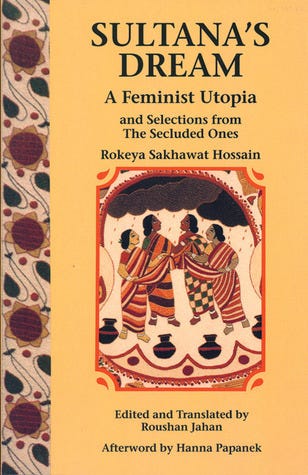

LEARN MORE: Read Rokeya's stories - “Sultana’s Dream” or “Padmarag.”🇮🇳 SAVITRIBAI PHULE
India’s 1st Female Teacher
India - 1831-1897
Poet, school founder & champion of women’s education in India. Likely the 1st female teacher in India, she gained her teaching credential in 1847. She & her husband started 18 schools, including India’s 1st school for girls in 1848 in Pune, as well as a center for pregnant rape victims & children who were rape victims. Phule faced resistance from community members & her own family; according to Women in History, “opponents would throw stones, dung and verbal abuse at Savitribai as she walked to the school everyday, however, she always carried a spare sari with her so she could change and carry on with her work.” Phule’s husband said, “my own father threw us out of the house” because his father thought their work educating girls was sinful. Phule opened a center that fed daily meals to over 2,000 children during the bubonic plague; she died after carrying a child with the plague to the hospital. She is called the “mother of Indian feminism.”


LEARN MORE: Read Phule's poems or a profile.4 SCHOOL FOUNDERS
🇮🇳 RABINDRANATH TAGORE
Kabiguru (Teacher of Poets)
India - 1861-1941
Poet, artist & social reformer. Barely attended formal school & learned through musicians hosted at his family’s home, his brother’s tutoring & independent study. Produced thousands of paintings, stories, poems & songs (he was the 1st non-European to win Nobel Prize for literature) - but critiqued traditional schools. His story, ‘The Parrot’s Training,’ shows how colonial schools kill the souls of students through mindless memorization. In 1901, started an ashram & experimental school in rural India to develop children’s curiosity/self-discovery/autonomy. Later started 4 schools & a university focused on the humanities. Tagore taught & wrote the textbooks; lessons were often outside & connected to nature, the arts, or students helping local villagers to problem-solve. He travelled widely & influenced writers & educationists in many countries, including the UK (co-founded the progressive Dartington Hall School). Known as kabiguru: “teacher of poets.”


LEARN MORE: Read about Tagore’s philosophies of education or ‘The Parrot’s Training,’ his parable that critiques traditional schools.🇲🇦 FATIMA AL-FIHRIYA
Umm al-Banīn (Mother of the Children)
Morocco - Circa 800-880
Founder of the world’s 1st university. After her father’s death, al-Fihriya used her inheritance to start a mosque & madrasa (school) in Fez in 859, that evolved into University of al-Qarawiyyin - the world’s 1st degree-granting institution (according to UNESCO), oldest continuously operating university & oldest library. Along with the House of Wisdom in Baghdad & Al-Azhar University in Cairo, al-Qarawiyyin was a hub for the Islamic Golden Age, which pioneered mathematics/sciences & influenced Western philosophy. According to Daily Sabah, “scholars and students from all over the Muslim world visited and enrolled…Fatima's ideas and vision influenced many universities across Europe.” For example, traditions today, such as the graduation gown & mortar board hat, come from al-Qarawiyyin. Al-Fihriya was called Umm al-Banīn - “mother of the children” - because she supported many boys to learn. (Some historians argue that she did not exist & her story is a myth.)


LEARN MORE: Read a profile of al-Fihriya.🇵🇰 SYED AHMAD KHAN
Advocate of Education for Muslims
India/Pakistan - 1817-1898
Writer & founder of an education association & university, who promoted British-style education to increase Muslim political power. Born in Delhi & influenced by the Tunisian political reformer Hayreddin Pasha, he advocated for adapting Western education/techniques while maintaining Indian traditions. Published widely, including “Address to the Natives of Hindoostan on Education.” Started Gulshan School, Victoria School, a science society for Muslims (to publish journals & translate scientific texts to Urdu) & Muhammadan Anglo-Oriental College (the 1st Muslim university in South Asia, that still exists today). Inspired after a trip to the UK, he wrote, “we aim to turn this MAO College into a University similar to that of Oxford or Cambridge.” The 1st two Prime Ministers of Pakistan were alumni. Founder of the Aligarh Movement & the Muhammadan Educational Conference in 1886, which promoted modern education for Muslims. Over 3,000 attended their 1906 conference in Dhaka & many started other schools; the women’s division started Khatoon, an Urdu monthly that encouraged women to pursue education. Conference attendees created the All-India Muslim League in 1906, a political party that advocated for India to be split; Partition in 1947 created Muslim-majority Pakistan.


LEARN MORE: Read about Khatoon magazine or a profile of Khan.5 POLICYMAKERS
🇦🇷 DOMINGO FAUSTINO SARMIENTO
Schoolmaster President
Argentina/Chile - 1811-1888
Teacher-turned President of Argentina who advocated for free, secular, mandatory universal education. Exiled by Argentina’s dictatorship to Chile, he started 2 schools & was founding Director of the 1st teacher training institute in South America (in the tradition of normal schools, which use lab schools to train teachers). Funded by Chile’s government, he visited Uruguay, Brazil, Tunisia & Italy on a 2-year trip to study education systems. In 1847, he met Horace Mann, who pioneered the 1st free government-funded universal education system in the US (after a trip to Prussia to learn from the world’s 1st public education system). In 1868, the year Sarmiento was selected to be Argentina’s President, he wrote, “the United States and Prussia as great nations is closely allied to their systems of universal education…if Republican Institutions are to be diffused throughout the world, patriots, instead of making revolutions, would begin by founding common schools.” In his 6 years as President, his team built 1,000 primary schools & teacher training institutes in all provinces (Horace Mann’s wife arranged for 65 teachers to travel to Argentina to help). Started newspapers & a journal for Chile’s department of education; wrote 18 books, including travelogues on observing education innovations in the US, Africa & Europe. In Argentina, he is called the “schoolmaster President” & September 11 (the anniversary of his death) is Teachers Day .


LEARN MORE: Read a 1945 Harvard Educational Review profile of Sarmiento.🇹🇿 JULIUS NYERERE
Mwalimu (Teacher)
Ghana - 1922-1999
President of Tanzania who linked education reform to his anti-colonial & Pan-Africanist vision. While most Tanzanians could not afford to go to school, Nyerere was allowed to attend a British school because his father was a tribal chief. Studied to be a teacher at Makerere in Uganda, began his career as a history teacher & formed a political party that advocated for Tanzania’s independence. In 1962, as the country’s 1st post-independence President, he wrote about his philosophies of education & promoted Ujamaa: African socialism that increased education/healthcare access, privatized companies & transitioned agriculture to collective farming. His most famous essay, “Education for Self-Reliance,” critiques colonial education & argues schools should teach skills relevant to a student’s life, such as farming. He writes, “we should not determine the type of things children are taught in primary schools by the things a doctor, engineer, teacher, economist, or administrator needs to know. Most of our pupils will never be any of these things. We should determine…the skills he ought to acquire…if he, or she, is to live…in a socialist and predominantly rural society.” “The Declaration of Dar es Salaam” outlines his philosophies of adult education. Unlike most politicians (who send their children to expensive private schools), Nyerere insisted that his 7 children attend government schools. Affectionately called mwalimu (teacher in Swahili).


LEARN MORE: Read Nyerere's essay “Education for Self Reliance” or a biography.Honorable Mentions:
Enrique Dussel - Argentina/Mexico
Charlotte Maxeke & Neville Alexander - South Africa
Fazle Hasan Abed - Bangladesh
Ama Ata Aidoo, Kwame Nkrumah & James Aggrey - Ghana
Frantz Fanon - Martinique
Jiddu Krishnamurti - India
Have another name? Add them in the comments!
For more lessons from the past, read about the oldest schools in the Global South or a history of how Kenya became the strongest education system in Africa.




Jesús Zúñiga shared an additional excellent example - Rafael Cordero, who is known as the "Father of Education in Puerto Rico" and ran a free school for children of all races and incomes (lived between 1790-1898)!
Nice to get connected with you Kat Pattillon